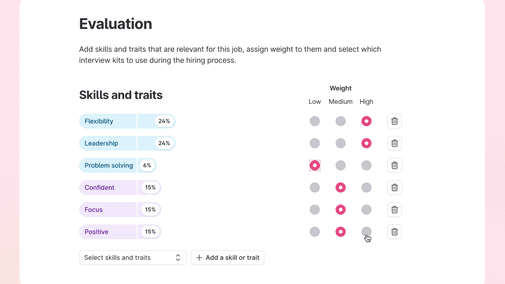

Scott van Dort
As Senior Copywriter at Teamtailor, my goal is to communicate, inform, educate, and inspire existing and potential users about our incredible, all-in-one recruitment solution.
It’s no secret that recruiting is a complex process, with the goal of every recruiter being to find the best candidate for the job. Yet, this isn't always as easy as it sounds.
For companies, being able to attract hundreds of candidates for a job is a wonderful “problem” to have. But if you’re a recruiter, it can be quite overwhelming when you have hundreds of applications to sift through.
Evaluating candidates properly requires a methodological approach. It requires evaluating candidates against key job criteria and prioritizing skills, experience, and cultural fit. For example, it might be more important to have technical skills for an engineering role, whereas communication skills may be more important for a client-facing one.
What is a job match score? 💡
One of the most effective and efficient ways to evaluate candidates is to assign weighted values (i.e., low, medium, high) to specific job criteria using recruitment software such as an applicant tracking system (ATS). The calculation of these values is what is known as a job match score, also known as a candidate match score.
You can think of a job match score as a type of candidate scoring card. Essentially, candidates’ job match scores can be used to quickly identify which candidates are the best fit for the role.
A candidate's job match score is determined by how well they match the job requirements and qualifications. When creating a job post using an ATS, recruiters can select the skills and traits required for the job and assign them their relative weight.
For example, recruiters can assign weight to skills and traits such as adaptability, analytical thinking, experience in specific programs, software or coding languages, soft skills, data analysis skills, customer acquisition experience, as well as personality traits such as empathy, attention to detail, drive, etc.
The proper way to assess candidates ✅
In a recent study of HR professionals, 52% said quality of hire was the most important metric at their company. To see more results from the study, download the Future of Recruitment Guide.
To evaluate the selected skills and traits, it’s important to consider what questions would help evaluate candidates during the application and interview processes. Imagine, for example, that for a specific role, the following attributes are important: cold-calling experience, experience with B2B, knowledge of a specific coding language, ability to communicate in French, as well as empathy, initiative, and adaptability. What kind of questions could you ask to determine someone's experience in these areas?
Johanna Engström, People & Attract Partner at SATS, the largest fitness and health chain in the Nordics, says that a job match score can bring structure to candidate evaluation.
A lot of information is required for recruiters to post job ads, screen and search for candidates, and conduct interviews. Every candidate gets the same questions. Interviews are conducted using competency-based techniques. So, getting a job match score is incredibly helpful.
You can read more about how SATS works with recruitment by downloading the SATS customer case.
Bringing structure to candidate interviews 📊
When setting up a new job post, recruiters can create what is known as an interview kit within their applicant tracking system. Recruiters can add desired skills and traits for the job along with any questions they want to ask based on the chosen skills and traits.
Once it’s completed, an interview kit should include everything a recruiter needs to conduct an interview, including interview questions and the chosen skills and traits for the role.
Creating interview kits ensures that everyone in your hiring team is aligned with your expectations and the way the interview should be conducted. Furthermore, rating each candidate using the same system leads to more objective decision-making.
As candidates progress through the recruitment stages, the hiring team completes the interview kit or kits if you’ve created numerous interview kits for each stage of the recruitment.
To create a job match score, the hiring team grades or scores the candidate in various areas including the candidate’s education, work experience, skills, traits, and achievements. After completing the interview kit, the hiring will be presented with a job match score, and a candidate’s suitability for a job is then determined by this score.
Evaluating candidates today is made much easier thanks to recruitment software and features such as a job match score. Implementing job match scores as part of your hiring process helps streamline recruitment, making candidate evaluations faster and more efficient, ultimately improving overall hire quality.
Want to see how a job match score is calculated in action and how interview kits work? 🚀
Recommended topics
![]()
How to improve quality of hire and why it matters more than ever
Every recruiter knows the importance of making the right hire but today quality of hire matters more than ever before.
![]()
How to post a job in Teamtailor and what you should consider when creating a job ad
Creating job ads that attract candidates is essential. We show you how to post a job in Teamtailor and what you should consider when posting a job ad.
![]()
What is an applicant tracking system? The must-have HR tool.
How are applicant tracking systems used? How can an ATS enhance the candidate experience and improve recruitment? Discover the ins and outs of ATS technology.


